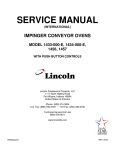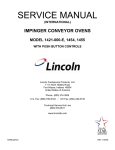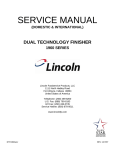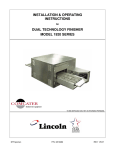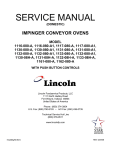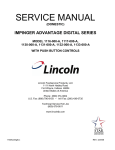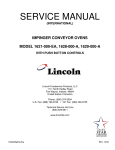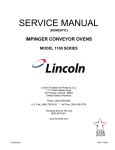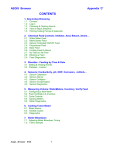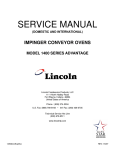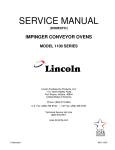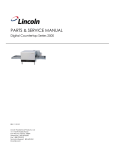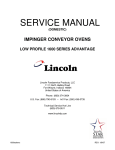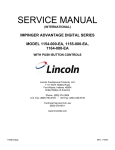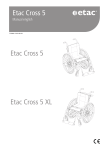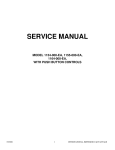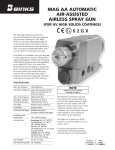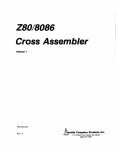Download PARTS & SERVICE MANUAL
Transcript
PARTS & SERVICE MANUAL Impinger Advantage Gas w/ Push Button Controls Advantage Digital Series - International MODELS: Please note that the model numbering system changed March 2007.The chart below shows the old model numbering system and its matching new model number. Old Model Number 1433-000-E 1433-000-E 1434-000-E 1434-000-E 1456 1457 → → → → → → → New Model Number 1433-00z-U-Kxxxx (Europe) 1446-00z-U-Kxxxx (Asia) 1434-00z-U-Kxxxx (Europe, Middle East, Africa) 1447-00z-U-Kxxxx (Asia) 1446-00z-U-Kxxxx 1457-00z-U-Kxxxx P/N: L371085 REV: 4.1.09 Lincoln Foodservice Products, LLC 1111 North Hadley Road Fort Wayne, Indiana 46804 Telephone: 260.459.8200 Fax: 888.790.8193 Technical Support: 800.678.9511 lincolnfp.com SEQUENCE OF OPERATION IMPINGER ADVANTAGE SERIAL NUMBER N28654 AND ABOVE (OVENS WITH PUSH BUTTON CONTROLS) MODEL 1433-000-E MODEL 1434-000-E MODEL 1456 MODEL 1457 POWER SUPPLY CONTROL BOX AUTO COOL DOWN MAIN FAN CIRCUIT BURNER CIRCUIT TEMPERATURE CONTROL CONVEYOR DRIVE 2 230VAC 230VAC 220/240VAC 220/240VAC 50 HZ. 50 HZ. 50 HZ. 50 HZ. NAT. GAS LP GAS NAT. GAS LP GAS Electrical power is to be supplied to the oven by a three conductor service. Brown conductor is hot. Blue conductor is neutral. Green conductor is ground. When the temperature in the control box reaches 120°F ± 3°F (48.9°C ± 1.7°C), the cooling fan thermostat will switch power to the control box cooling fan. The thermostat will interrupt power to the cooling fan when the control box temperature falls to 100°F ± 3°F (37°C ± 1.7°C). Electrical power is permanently supplied, through the 10 Amp oven fuse, to a normally open contact of the oven power switch. Power is also supplied to the control box cooling fan. Closing the oven power switch supplies line voltage to the main fan motor. Closing the oven power switch also supplies line voltage to the heat circuit and to the primary of the oven control transformer. Closing the oven power switch supplies line voltage through the main fan air pressure switch, through the normally closed oven cavity hi-limit thermostat. Through the gas pressure proving switch (gas pressure switch removed at S/N N31348) to the ignition control. The combustion motor is now energized, the normally open combustion air switch closes upon sensing air. After a pre-purge period between 30 and 60 seconds, the spark generator and the main gas valve are energized. Ignition should now occur Closing the oven fan switch supplies line voltage to the primary of the control transformer and through the ignition control, to the oven control. Secondary voltage, 24VAC, is supplied to the oven control. The oven control is set to desired temperature. The thermocouple will provide varying millivolts to the oven control. The oven control supplies line voltage to the temperature regulation valve at intermittent intervals to maintain desired temperature. The display on the oven control will indicate when the temperature regulation valve is energized. NOTE: The display also indicates oven temperature. Closing the oven power switch supplies line voltage to the conveyor motor and to the primary of the control transformer. Secondary voltage, 24VAC, is supplied to the oven control. Setting the oven control to the desired time outputs voltage, through a reversing switch, to the conveyor motor. NOTE: The conveyor system uses a hall effect sensor and magnet to prove operation of the conveyor motor. If the motor is not running, “BELT JAM” is indicated on the display. Impinger I – Adv Digital – Gas Service Manual – International SCHEMATIC DIAGRAM MODEL 1433-000-E, 1434-000-E SERIAL NUMBER N28654 TO N31348 Impinger I – Adv Digital – Gas Service Manual – International 3 SCHEMATIC DIAGRAM MODEL 1456, 1457 SERIAL NUMBER N28654 TO N31348 4 Impinger I – Adv Digital – Gas Service Manual – International SCHEMATIC DIAGRAM MODEL 1433-000-E, 1434-000-E, 1456, 1457 SERIAL NUMBER N31349 AND ABOVE Impinger I – Adv Digital – Gas Service Manual – International 5 TROUBLESHOOTING GUIDE IMPINGER ADVANTAGE GAS OVENS SERIAL NUMBER N28654 AND ABOVE (OVENS WITH PUSH BUTTON CONTROLS) SYMPTOM Oven fan will not run POSSIBLE CAUSE Incoming power supply Fuse, 10 Amp Fuse holder Switch, oven power Motor, main fan No control box cooling Incoming power supply Fuse, 10 Amp Fuse holder Switch, oven power Cooling fan No automatic control box cooling Incoming power supply Cooling fan thermostat Control box cooling fan continues to run Cooling fan thermostat Oven will not heat S/N N31348 and Below Main fan Gas supply Air pressure switch Oven cavity hi-limit thermostat Gas pressure switch 6 EVALUATION Check circuit breaker, reset if required. Check power plug to be sure it is firmly in receptacle. Measure incoming power, call power co. if required. Check, replace if necessary. Check, replace if necessary. Check for line voltage supplied to switch. If no voltage is present, trace wiring back to fuse holder. Check continuity between switch terminals. Replace switch as needed. Check for line voltage supplied to motor. If no voltage is present, trace wiring back to oven power switch. Check motor for opens, shorts or grounds. WITH POWER OFF: Turn fan blade to check for locked rotor. Check circuit breaker, reset if required. Check power plug to be sure it is firmly in receptacle. Measure incoming power, call power co. if required. Check, replace if necessary. Check, replace if necessary. Check for line voltage supplied to switch. If no voltage is present, trace wiring back to fuse holder. Check continuity between switch terminals. Replace switch as needed. Check for supply voltage to the cooling fan. If no voltage is present, trace wiring back to the fuse holder. If voltage is present and motor does not run, check motor for opens shorts or grounds. WITH POWER OFF: Check for locked rotor. Check circuit breaker, reset if required. Check power plug to be sure it is firmly in receptacle. Measure incoming power, call power co. if required. Check cooling fan thermostat (thermostat closes at 120°F and opens at 100°F). With cooling fan thermostat pre-heated, check for continuity See “Cooling fan thermostat” (NOTE: Thermostat will remain closed if control box temperature remains above 120°F. If not operating, refer to “Oven fan will not run” Check for adequate gas supply and be sure that the manual gas shut off valve is open. Also check flexible gas line connection. Check air switch terminals for supply voltage to terminals NO2 and COM. If voltage is present on one side only, check for air tube blockage or misalignment. If these are okay, adjust air pressure switch or replace switch as needed. Terminals are normally closed, opens at 350°C (660°F). If open, reset and test oven for proper operation. If thermostat will not hold for maximum temperature, and oven is not exceeding control setting, check for proper location of the capillary bulb in its spring holder. If above checks are okay, replace hi-limit thermostat. This switch is located inside the gas valve and should close when gas pressure is present. Impinger I – Adv Digital – Gas Service Manual – International Ignition control Burner reset switch Burner blower motor Burner blower motor air pressure switch Spark generator Igniter/sensor assembly Gas valve Flame will not stay on Flame sensor Power supply Ignition control Impinger I – Adv Digital – Gas Service Manual – International WITH POWER OFF: Remove 3 prong plug (on gas valve) and measure continuity between terminals 2 and 3. If no continuity, check the following: Proper gas pressure supply to gas valve as marked on the oven specification plate. Check for proper adjustment of the gas pressure switch, 10 for Nat. gas, 27 for LP gas or 4.5 for town gas. Check the filter in the gas valve for blockage or damage. If above checks are okay, but pressure switch is still not closed, replace gas valve. Check for supply voltage to ignition control at terminal #1 and neutral. If no voltage is present, trace wiring back to gas pressure switch. If voltage is present, check for supply voltage to burner blower motor at terminal #6 and neutral. If no voltage is present, wait 30 seconds, reset ignition control, and re- try. If the above fails, replace ignition control. Switch is normally open. Check to see that the switch closes when reset button is pushed. Replace as needed. Check for supply voltage to burner blower motor. If no voltage is present, trace wiring back to the ignition control. WITH POWER OFF: Turn blower wheel to check for locked rotor. If supply voltage is present and motor does not run, replace burner blower motor. Check for supply voltage switching to terminal NO as the air pressure switch closes. Check for air tube blockage or misalignment, adjust air pressure switch. If the above fails, replace air pressure switch. After a pre-purge time of 30 to 60 seconds after burner blower motor starts, check for supply voltage to spark generator. If voltage is not present, check burner reset switch. If voltage is still not present, replace ignition control. If voltage is present, visually check for spark at igniter. Check for visible damage to the igniter/sensor assembly. If there is no visible damage to the components, and no spark, replace the spark generator. If there is visible damage to the igniter/sensor assembly, replace. Also check for frayed or damaged wires in burner tube. Check for supply voltage to gas valve. If no voltage is present, check reset button. Check all connections for tightness. If there is still no voltage at the gas valve, replace ignition control. If there is voltage present, check for gas pressure at gas pressure tap located in gas piping. If there is no gas pressure, replace gas valve. Check for flame sensor operation, connect a digital multimeter (capable of measuring DC microamps) between the flame sensor wire and terminal #1 on the ignition control. Sensor current is to be 3 microamps, minimum. If these readings are not achieved, replace igniter/sensor assembly. Also check for any type of damage to flame sensor wire and connections. NOTE: The DC microamp test must be conducted with the oven in low flame (bypass) operation. Set the temperature to the lowest temperature setting. If there is sufficient microamp current, but the flame will not stay on, check for proper polarity of the power supply. If there is sufficient microamp current, and there is proper polarity of the power supply, but the burner will 7 Oven will not heat S/N N31349 and Above Main fan Gas supply Air pressure switch Oven cavity hi-limit thermostat Ignition control Burner reset switch Burner blower motor Burner blower motor air pressure switch Ignition control Igniter/sensor assembly Ignition control Gas valve 8 not stay on, check the reset button for the ignition control. If the above check okay, replace ignition control. If not operating, refer to “Oven fan will not run” Check for adequate gas supply and be sure that the manual gas shut off valve is open. Also check flexible gas line connection.. Check air switch terminals for supply voltage to terminals COM and NO. If voltage is present on one side only, check for air tube blockage or misalignment. If these are okay, adjust air pressure switch or replace switch as needed. Terminals are normally closed, opens at 350°C (660°F). If open, reset and test oven for proper operation. If thermostat will not hold for maximum temperature, and oven is not exceeding control setting, check for proper location of the capillary bulb in its spring holder. If above checks are okay, replace hi-limit thermostat. Check for supply voltage to ignition control at terminal #1 and neutral. If no voltage is present, trace wiring back to hi-limit thermostat. If voltage is present, check for supply voltage to burner blower motor at terminal #8 and neutral. If no voltage is present, wait 30 seconds, reset ignition control, and re- try. If the above fails, replace ignition control. Switch is normally open. Check to see that the switch closes when reset button is pushed. Replace as needed. Check for supply voltage to burner blower motor. If no voltage is present, trace wiring back to the ignition control. WITH POWER OFF: Turn blower wheel to check for locked rotor. If supply voltage is present and motor does not run, replace burner blower motor. Check for air pressure switch to be switching from “NC” to “NO”. Check for air tube blockage or misalignment. Adjust air pressure switch. If the above fails, replace air pressure switch. A pre-purge time of 30 to 60 seconds occurs after burner blower motor starts. Check for high voltage spark output from the ignition control. If there is no high voltage spark output, check reset button for the ignition control. If there is still no high voltage output, replace the ignition control. Check for visible damage to the igniter/sensor assembly. If there is visible damage to the igniter/sensor assembly, replace. If there is no visible damage to the components, and no spark, replace the igniter/sensor assy. Also check for frayed or damaged wires in burner tube. Replace components as needed. Gas valve should open as the ignition control generates the high voltage spark. Check for supply voltage to pilot valve at terminal #5 and neutral. If no voltage is present, check reset button for the ignition control. If there is still no voltage to the pilot valve, replace ignition control. Check for supply voltage to pilot valve terminal #5 to neutral, if there is no voltage, trace wiring back to ignition control. If there is supply voltage, connect a manometer to the pressure tap fitting on the gas valve. If Impinger I – Adv Digital – Gas Service Manual – International Pilot tube Pilot orifice Flame will not stay on Flame sensor Power supply Ignition control Low flame is on, but no main flame NOTE: Flame should be on at this time Control transformer Oven control Thermocouple Impinger I – Adv Digital – Gas Service Manual – International there is voltage to the pilot valve, but there is no gas pressure, replace gas valve. Check for gas pressure at pilot tube. Disconnect pilot tube at burner and connect manometer. If there is no gas pressure, check for blockage in pilot tube. Repair or replace as needed. If there is gas pressure at the pilot tube, check the pilot orifice for damage or obstructions. Replace pilot orifice as needed. To check flame sensor operation, connect a digital multimeter (capable of measuring D.C. microamps) between the flame sensor wire and the flame sensor connection on the ignition control (terminal #13). Flame sensor current is to be 0.7 microamps, minimum. If these readings are not achieved, replace igniter/sensor assembly. Also check for any type of damage to flame sensor wire and connections. NOTE: The D.C. microamp test must be conducted with the oven in low flame (bypass) operation. Set the temperature to the lowest temperature setting. If there is sufficient microamp current, but the flame will not stay lit, check for proper polarity of the power supply. If there is sufficient microamp current, and there is proper polarity of the power supply, but the burner will not stay lit, check the reset button for the ignition control. If the above test is okay, replace the ignition control. Check for supply voltage to primary of control transformer. If no voltage is present, trace wiring back to oven power switch. If voltage is present, check for 24VAC at transformer secondary. If there is primary voltage, but no secondary voltage, replace control transformer. Check for 24VAC supply to oven control. If no voltage is present, trace wiring back to control transformer. Check for supply voltage to oven control. If no voltage is present, trace wiring back to ignition control. If voltage is present, check for a read-out on the display. If there is no read-out on the display, replace oven control. If there is a read-out on the display, set the oven control to maximum temperature (see installation operations manual for temperature adjustment). With the oven control at maximum temperature, check for supply voltage to the temperature regulation valve. If there is voltage at the temperature regulation valve, proceed to “Temperature regulation valve “. If there is no voltage at the temperature regulation valve, trace wiring back to the oven control. If there is no voltage output at the oven control, check the read-out on the oven control. If the oven control reads “PROBE FAIL” this indicates that the thermocouple has failed or become disconnected from the oven control Check to see that the thermocouple is securely connected to the oven control. If the thermocouple is connected to the oven control, and the display indicates “PROBE FAIL”, disconnect the thermocouple from the oven control and measure the resistance of the thermocouple. The thermocouple should read approx. 11Ω. If these readings are not achieved, replace the thermocouple. If these readings are correct, proceed. 9 Oven control Thermocouple Oven control Temperature regulation valve Intermittent heating Thermal/overload of main fan and burner blower motor Conveyor will not run Incoming power supply Fuse, 10 Amp Fuse holder Switch, oven power Control transformer Conveyor motor Capacitor, conveyor motor Switch, conveyor reversing Oven control Conveyor motor runs, but there is no speed display NOTE: Display will indicate “BELT JAM” Oven control 10 If the thermocouple checks good, but the oven control display indicates that there is a thermocouple failure, replace the oven control. If the oven control indicates a temperature reading, but the oven will not heat, proceed. WITH POWER ON AND THERMOCOUPLE ATTACHED TO THE OVEN CONTROL: Measure the DC millivolt output of the thermocouple. Refer to the thermocouple chart (located in the “Removal” section of the manual) for proper millivolt readings. If these readings are not achieved, replace thermocouple. If the thermocouple checks good, but there is no supply voltage output to the temperature regulation valve, replace the oven control. If there is supply voltage output to the temperature regulation valve, proceed. Check for supply voltage to the temperature regulation valve. If voltage is present, listen for valve to open and close. Also check for opens or shorts in the operating coil. Replace temperature regulation valve as needed. The main fan motor and burner blower motor are equipped with internal thermal protection and will cease to operate if overheating occurs. As the motors overheat and cool, this will cause the heating system to cycle on and off intermittently. Improper ventilation or lack of preventive maintenance may cause this problem. Also most of the problems listed under “Oven will not heat” can cause intermittent failure. Check circuit breaker, reset if required. Check power plug to be sure it is firmly in receptacle. Measure incoming power, call power co. if required. Check, replace if necessary. Check, replace if necessary. Check for line voltage supplied to switch. If no voltage is present, trace wiring back to fuse holder. Check continuity between switch terminals. Replace switch as needed. Check for supply voltage to primary of control transformer. If no voltage is present, trace wiring back to oven power switch. If voltage is present, check for 24VAC at transformer secondary. If there is primary voltage, but no secondary voltage, replace control transformer. Check for supply voltage to the conveyor motor at terminal #6 to neutral. If no voltage is present, trace wiring back to oven power switch. If voltage is present, but the motor will not run, check the motor windings for opens or shorts. If any of the above checks fail, replace conveyor motor. Check for shorts or grounds. Replace capacitor as needed. WARNING: Capacitor has a stored charge, discharge before testing. Check continuity between switch terminals. Replace switch as needed. If there is voltage supplied to the motor, and the motor capacitor and reversing switch check good, replace the oven control. Check for output voltage from oven control to hall effect Impinger I – Adv Digital – Gas Service Manual – International Conveyor motor Oven control Impinger I – Adv Digital – Gas Service Manual – International sensor (sensor is located in the conveyor motor). Measure voltage at the motor connector, red wire and yellow wire. Voltage should be approx. 10VDC. If no voltage is present, trace wiring back to oven control. If there is no voltage output at the oven control, replace oven control. If there is voltage supplied to the hall effect sensor, check for a frequency output from the hall effect sensor. Measure frequency across the yellow and white wires in the motor connector. Frequency reading should be approx. 25-100 Hz. If these readings are not achieved, replace conveyor motor. If the readings are achieved, proceed. If the hall effect sensor readings are correct, but there is no speed indicated on the display, replace the oven control. 11 REMOVAL, INSTALLATION & ADJUSTMENTS IMPINGER ADVANTAGE SERIES CAUTION! BEFORE REMOVING OR INSTALLING ANY COMPONENT IN THE IMPINGER OVEN BE SURE TO DISCONNECT ELECTRICAL POWER AND GAS SUPPLY MOTOR, MAIN FAN - REPLACEMENT 1. Shut off power at main breaker. 2. Remove louvered motor cover from back of oven. 3. Remove wireway by taking out the (5) five hex screws. 4. Disconnect wiring from motor. 5. Remove the twelve (12) hex head bolts from the oven back and slide back straight out of the oven. 6. Remove two (2) bolts from fan hub and remove fan from motor shaft. NOTE: Measure distance from fan blade to rear wall assembly before removal to aid in reassembly. 7. Remove the eight (8) hex head bolts from the motor mount and slide the motor assembly out of the oven back. 8. Remove motor by taking off motor clamp and removing the four (4) mounting nuts and washers. 9. Reassemble in reverse order. When motor mount assembly is set on the oven back, align motor shaft in the center of the hole. Set fan assembly on the motor shaft. NOTE: A. Torque specs on bolts (150 in/lb. torque) B. It is recommended that an anti-seize compound be brushed on to the bolts around the back and motor mount bracket before assembly. FAN, MAIN - REPLACEMENT Shut off power at main breaker. Remove back assembly. (See MOTOR, MAIN FAN)) Reinstall and locate fan so that the bottom of the fan spider is 1 1/2" from the top of the oven back cone. (See Drawing) FAN SPIDER NOTE: MEASUREMENT MUST BE MADE FROM CONE TO FAN SPIDER FAN HUB 1 1/2 INCH CONE CAPACITOR, MOTOR - REPLACEMENT 1. Shut off power at main breaker. 2. Remove motor cover from back of oven. 3. Discharge capacitor. 4. Remove and replace. COOLING FAN, CONTROL BOX - REPLACEMENT 1. Shut off power at main breaker. 2. Remove control panel top and front cover. 3. Remove four (4) screws from the fan frame. 4. Disconnect cord and plug and remove fan. 5. Reassemble in reverse order. 12 Impinger I – Adv Digital – Gas Service Manual – International THERMOSTAT, COOLING FAN - REPLACEMENT 1. Shut off power at main breaker. 2. Remove control panel top and front cover. 3. Remove lead wires and mark for reassembly. 4. Remove two (2) screws and remove thermostat. 5. Reassemble in reverse order. BURNER BLOWER MOTOR - REPLACEMENT 1. Shut off power at main breaker. 2. Remove control panel top and front cover. 3. Unplug motor connector. 4. Remove three (3) screws from blower tube at burner housing. 5. Remove air shutter assembly from old motor for installation on new motor assembly. 6. Reassemble in reverse order and check system operation. NOTE: Check air shutter adjustment and adjust if necessary Set air shutter at approx. 1/4" and adjust to get a blue flame with an occasional tip of yellow under high flame. A view port in the burner assembly should be used to observe flame. BLOWER WHEEL, BURNER This is part of the burner blower motor assembly. TO REMOVE THE BLOWER WHEEL FOR PERIODIC CLEANING: 1. Shut off power at main breaker. 2. Remove control panel top and front cover. 3. Remove air shutter held by 3 screws. 4. Loosen set screws on blower wheel hub and pull straight out. 5. Reassemble in reverse order. NOTE: There is no critical placement of the blower wheel on the motor shaft. Just back as far as it will go and then spin the blower to be sure it is not rubbing. BURNER CONTROL – REPLACEMENT (S/N N31348 and Below) 1. Shut off power at main breaker. 2. Remove control panel top and front cover. 3. Remove front portion of control by releasing tabs on sides and pulling out (rocking motion). 4. Remove wires from plug in terminal strip, note wire numbers and location. 5. Remove two screws from mounting bracket and remove. 6. Reassemble in reverse order and check system operation. BURNER CONTROL – REPLACEMENNT (S/N N31349 and above) 1. Shut off power at main breaker. 2. Remove control panel top and front cover. 3. Remove wires from control. Mark all wiring for reassembly. 4. Remove two mounting screws from control and remove control. 5. Reassemble in reverse order and check system operation. BURNER ASSEMBLY 1. Shut off power at main breaker. 2. Shut off gas supply. 3. Remove control panel top and front panel. 4. Remove gas control valve (See "GAS CONTROL VALVE") 5. Disconnect pilot tube. 6. Remove solenoid valve. (See "TEMPERATURE REGULATION VALVE") 7. Remove four (4) screws that secure the burner backing plate. Impinger I – Adv Digital – Gas Service Manual – International 13 8. Remove burner assembly from housing, the main and pilot orifice, flame target, pilot shield (main and extension), burner ignitor can now be changed or serviced as needed. 9. Reassemble in reverse order. Check all gas line fittings for leaks. GAS CONTROL VALVE – REPLACEMENT (S/N N31348 and Below) 1. Shut off power at main breaker. 2. Shut off gas supply. 3. Remove control panel top and front cover. 4. Remove the four screws from the incoming nipple mounting bracket and remove pipe. 5. Disconnect two plugs from gas control valve and mark locations. 6. Remove pilot tube assembly from gas control valve. 7. Disconnect pipe union just above temperature regulation valve. 8. Remove piping from old valve for installation on new valve. 9. Reassemble in reverse order. Check all gas line fittings for leaks. After assembling, check for proper adjustment of gas pressure switch, 10 on dial for natural gas, 27 for LP gas or 4.5 for town gas. 10. Check and adjust manifold pressure. Remove pressure tap located in gas piping and install manometer. Adjustment screw is located on the front of the valve, adjust as needed. 2.5” W.C. for natural gas, 10” for LP or 2.0” W.C. for town gas. 11. Check filter by removing cover plate (located on either side of valve). Remove four screws and slide filter out of valve and inspect. Reassemble in reverse order and check for leaks. GAS CONTROL VALVE – REPLACEMENT (S/N N31349 and Above) 1. Shut off power at main breaker. 2. Shut off gas supply. 3. Remove control panel top and front cover. 4. Disconnect the gas piping from the back of the unit. 5. Remove the mounting screw from the incoming pipe nipple and remove the incoming piping nipple. 6. Remove pilot tube assembly from gas valve. 7. Disconnect wiring from gas valve. Mark all wiring for reassembly. 8. Disconnect pipe union and remove gas valve. 9. Remove piping from old valve and reassemble in reverse order. 10. Check system for proper operation. Check all gas line fittings for leaks. 11. Adjust the gas manifold pressure on the gas valve. Refer to the specification plate on the oven for proper rating. TEMPERATURE REGULATION VALVE - REPLACEMENT 1. Shut off power at main breaker. 2. Shut off gas supply. 3. Remove control panel top and front cover. 4. Remove gas control valve (See "GAS CONTROL VALVE") 5. Disconnect wires from temperature regulation valve. 6. Remove two (2) hex nuts that hold main orifice bracket in place. 7. Remove temperature regulation valve assembly. 8. Remove piping from temperature regulation valve. 9. Reassemble in reverse order. 10. Check all fittings for leaks. SWITCH, BURNER RESET – REPLACEMENT 1. Shut off power at main breaker. 2. Remove control box cover and front panel. 3. Disconnect reset switch wires from burner control and mark for reassembly. 4. Pull off black button from switch and remove mounting nut. Remove switch from control box. 5. Reassemble in reverse order and check system operation. 14 Impinger I – Adv Digital – Gas Service Manual – International THERMOSTAT, OVEN CAVITY HI-LIMIT – REPLACEMENT 1. Shut off power at main breaker. 2. Remove control box cover and front panel. Remove conveyor assembly and fingers from oven to aid in removal of thermostat from oven. 3. Disconnect wires from thermostat and mark for reassembly. 4. Remove thermostat from oven. 5. Reassemble in reverse order and check system operation. BURNER IGNITOR - REPLACEMENT 1. Shut off power at main breaker. 2. Remove control panel top and front cover. 3. Remove burner assembly. (SEE "BURNER ASSY.") 4. Remove pilot shield and pilot shield extension. 5. Remove burner ignitor. 6. Reassemble in reverse order (spark gap approx. .100 in. or 2.5 mm) NOTE: Be sure to reconnect burner ignitor cable to ignition control. BURNER ALARM – REPLACEMENT 1. 2. 3. 4. 5. Shut off power at main breaker. Remove control panel top and front cover. Remove two wires from alarm and mark for reassembly. Remove mounting ring from burner alarm and remove alarm. Reassemble in reverse order and check system operation. SPARK GENERATOR – REPLACEMENT 1. 2. 3. 4. 5. Shut off power at main breaker. Remove two wires for spark generator. Unplug connector on bottom of spark generator. Remove two mounting screws and remove spark generator. Reassemble in reverse order and check system operation. AIR PRESSURE SWITCH – REPLACEMENT 1. Shut off power at main breaker. 2. Remove control panel top and front cover. 3. Disconnect wires from air pressure switch and mark for reassembly. 4. Remove air switch tube from air pressure switch. 5. NOTE: There are two types of air pressure switches used. Remove air pressure switch from its mount. 6. Reassemble in reverse order and check system operation. 7. To adjust air pressure switch, remove cover from switch to expose adjusting screw. To increase sensitivity, turn screw counter-clockwise. To decrease sensitivity, turn screw clockwise. THERMOCOUPLE (TYPE K) - REPLACEMENT 1. Shut off power at main breaker. 2. Remove control panel top and front cover. 3. Slide thermocouple out of oven chamber. NOTE: Remove conveyor and bottom fingers to aid in removal and installation of thermocouple. 4. Remove two (2) wires from temperature control. Make note of wire numbers or color and location for reinstallation. 5. Reassemble in reverse order making sure the metal end on the thermocouple is in the wire form in the oven chamber. Impinger I – Adv Digital – Gas Service Manual – International 15 THERMOCOUPLE MEASURMENT TEMPERATURE 200° 250° 300° 350° 400° 450° 500° 550° 600° D.C. MILLVOLTS (APPROX.) 2.8 4.0 5.1 6.0 7.1 8.2 9.3 10.4 11.5 CONTROL TRANSFORMER - REPLACEMENT 1. Shut power off at main breaker. 2. Remove control panel top and front cover. 3. Remove two (2) wires on primary side, note color and location. 4. Remove two (2) wires on secondary side, note color and location. 5. Remove two (2) screws from transformer base and replace assembly. 6. Reinstall in reverse order and check system operation. CONVEYOR DRIVE MOTOR - REPLACEMENT 1. Shut power off at main breaker. 2. Remove control panel top and front cover. 3. Loosen set screw on conveyor drive sprocket and slide sprocket off shaft. 4. Disconnect motor plug. 5. Remove four (4) screws from motor frame, on control box side, and remove motor assembly. 6. Reassemble in reverse order making sure to align chain sprockets and adjust motor for proper chain tension (1/2" SAG). CAPACITOR, CONVEYOR MOTOR – REPLACEMENT 1.Shut off power at main breaker. 2.Remove control box cover and front panel. 3.Discharge capacitor before removing wires. Mark wires for reassembly. 4.Remove mounting screw and remove capacitor. 5.eassemble in reverse order and check system operation. REVERSING SWITCH – REPLACEMENT 1. Shut off power at main breaker. 2. Remove control box cover and front panel. 3. Disconnect wires from reversing switch and mark for reassembly. 4. Remove mounting nut and remove reversing switch. 5. Reassemble in reverse order and check system operation. REVERSING CONVEYOR DIRECTION All ovens leaving our plant are wired to operate conveyors from left to right. To reverse conveyor direction, use the following procedure. 1. Shut off power at oven switch. 2. Set conveyor reversing switch in the other position. 3. Turn oven “on” and check for proper operation. MAIN ORIFICE - REPLACEMENT 1. Shut off power at main breaker. 2. Remove control panel top and front panel. 3. Remove gas control valve assy. 4. Remove two (2) nuts from burner orifice bracket. 5. Disconnect pipe union. 16 Impinger I – Adv Digital – Gas Service Manual – International 6. Remove assembly and replace main orifice. 7. Reassemble in reverse order and check system operation. NOTE: Check all gas line fittings for leaks. PILOT ORIFICE - REPLACEMENT 1. Shut off power at main breaker. 2. Shut off gas supply. 3. Remove burner assembly (See "Burner Assembly"). 4. Remove pilot line from pilot orifice. 5. Remove pilot orifice from burner ignitor. 6. Reassemble in reverse order. NOTE: Check all gas line fittings for leaks. ON-OFF SWITCH - REPLACEMENT 1. Shut off power at main breaker. 2. Remove control box cover. 3. Remove access cover. 4. Depress spring clips on side of switch and push out. 5. Remove wires from back of switch, note wire number and location. 6. Reassemble in reverse order and check system operation. NOTE: Make sure switch housing is fully seated in control box housing. OVEN CONTROL – REPLACEMENT A. B. C. D. E. F. G. Shut off power at main breaker. Remove control box cover and front panel. Remove all wiring connections and mark for reassembly. Remove oven control by pulling control from the mounting pins. Remove control from oven. Before installing new oven control, set voltage jumper (located at the bottom center of the oven control) to the proper voltage (120V/240V) position. Install the four pushbutton extensions (included with the oven control) by pushing the extensions onto the four set buttons on control. Reassemble in reverse order and check system operation. Set the oven control for the proper operating mode. The 1400 series ovens use a single temperature control system. The oven control must be set to the proper operating mode. Set the control as follows: With the oven power switch “off”, depress the “time” and “up” buttons and turn the oven “on”. Control will indicate “Imp I or Imp II” Release the buttons. Press the “up” or “down” button until “Imp I” and “temp to store” appears on the display. Press the “temp” button. The control is now set for Impinger I conveyor and single burner operation. FUSE HOLDER – REPLACEMENT 1. 2. 3. 4. 5. Shut off power at main breaker. Remove control box cover. Remove all wiring from fuse holder and mark for reassembly. Remove mounting nut for fuse holder and remove fuse holder. Reassemble in reverse order and check system operation. BEARING, CONVEYOR – REPLACEMENT 1. 2. 3. 4. 5. Remove conveyor from oven and place on flat work surface. Remove connecting links from conveyor belt. See Installation and operations manual. Remove conveyor belt from conveyor. Remove drive sprocket from drive shaft if required. Move shaft toward end of conveyor, and shaft with bearings will now slip out of holding bracket. Replace bearing and reassemble in reverse order. Impinger I – Adv Digital – Gas Service Manual – International 17 GENERAL VIEW ADVANTAGE SERIES LETTER A B C D E F G H J K L M N O P Q R S T U V W X Y Z * AA BB CC DD EE FF GG HH JJ KK LL MM NN OO PP QQ 18 PART NUMBER 369003 369110 369337 369929 369828 369209 369310 369308 369334 369309 350638 369311 369336 369906 370110 369157 1534 369057 369643 1009 369062 369140 369903 369141 369139 369058 369211 369203 369749 369204 369373 369748 369328 369052 369030 369904 369053 369055 369218 369926 369925 369927 DESCRIPTION Door hinge Access window assembly Retainer (old style) Retainer (new style) Handle spacer Latch & strike Screw, 6-32 x 3/16” Bottom, access window Access door glass Top, access window Handle Handle spacer (2 req.) Door latch Screw, 8-32 x 5/8” Door assembly (solid) Door assembly (with window) Finger support assembly Support bracket pin Strike assembly Oven top Top, control box Compression spring Washer, flat Conveyor hold down bracket Shoulder screw Baffle, inlet and outlet Thumb screw (not shown) Stud, wing head Chain cover kit (includes AA, CC) Split ring retainer Receptacle, snap –in Bracket, chain cover Leg, stand Adjustable leg Caster, 6” Insulation holder assembly Finger housing Columnating plates – see installation operations manual Finger cover Crumb pan, internal Window frame, bottom Glass, access window Window frame, top Impinger I – Adv Digital – Gas Service Manual – International Impinger I – Adv Digital – Gas Service Manual – International 19 CONTROL BOX 1456,1457,1433-000-E, 1434-000-E LETTER A B C D E F G H I J K L M N O P Q R S T U V W X Y Z AA BB CC DD EE FF GG HH II Not shown Not shown 20 PART # 369062 370355 370363 370354 369432 369580 370433 369570 369571 370186 369072 369099 370114 369144 369202 369076 369075 369142 370362 369589 369399 369400 369158 370373 370359 369368 369378 369507 369025 369575 369192 370360 369574 369579 370241 369573 370396 369331 369073 369100 357107 369014 DESCRIPTION Top, Control Panel Oven Control Front Cover Assembly Facia, Label Switch, On/Off Gas Valve, Multi Block (S/N N31348 & Below) Gas Valve (S/N N31349 & Above) Connector, 3 Pole Connector, 4 Pole Solenoid Valve Main Orifice, Nat. Main Orifice, LP Main Orifice, Town Gas Pilot Shield Extension Pilot Shield, Main Burner Igniter Flame Sensor Flame Target Thermocouple (Type K) Blower Motor Air Shutter Assembly Shutter, MVB Air Plate Drive Sprocket Conveyor Motor Reversing Switch Thermostat, Hi-Limit Cooling Fan Cooling Fan Thermostat Blower Air Switch Air Pressure Switch Capacitor Capacitor, Conveyor Motor Spark Generator (S/N N31348 & Below) Solid State Alarm Transformer, Control Ignition Control (S/N N31348 & Below) Ignition Control (S/N N31349 & Above) Finger Guard Bypass Orifice, NAT Bypass Orifice, LP Fuse holder Fuse, 10 A. Impinger I – Adv Digital – Gas Service Manual – International Impinger I – Adv Digital – Gas Service Manual – International 21 OVEN BACK ADVANTAGE SERIES GAS AND ELECTRIC LETTER A B C D E F G H J K M 22 PART NUMBER 369808 370140 369214 369033 369215 369192 369306 369646 369647 369213 369547 369287 369315 369122 DESCRIPTION Cover, motor (gas ovens) Cover, motor (electric ovens) Motor, main fan (50 Hz.) Motor clamp Motor support assembly Capacitor, 7.5 MFD Oven back assembly, gas oven Stand-off Inlet panel Main fan Bracket, thermostat Heating element, 208V Heating element, 220V Heating element, 240V Impinger I – Adv Digital – Gas Service Manual – International Impinger I – Adv Digital – Gas Service Manual – International 23 CONVEYOR 1450 SERIES LETTER A B C D E F G H J K L M 24 PART NUMBER 369830 369816 369163 370092 369362 369825 369813 369314 369812 369160 369814 369005 369811 369161 369806 370050 369162 DESCRIPTION Complete conveyor assembly Conveyor belt, complete (30 inch wide belt) Conveyor belt, complete (32 inch wide belt) Conveyor belt, 1 foot section (30 inch wide belt) Conveyor belt, 1 foot section (32 inch wide belt) Retaining ring Conveyor bearing block Roll, conveyor, notched Conveyor idler shaft Conveyor pan stop Connecting link (30 inch wide belt) Connecting link (32 inch wide belt) Conveyor drive shaft Roller chain sprocket Crumb pan Conveyor frame Drive chain Impinger I – Adv Digital – Gas Service Manual – International Impinger I – Adv Digital – Gas Service Manual – International 25 This page intentionally left blank. 26 Impinger I – Adv Digital – Gas Service Manual – International This page intentionally left blank. Impinger I – Adv Digital – Gas Service Manual – International 27 28 Impinger I – Adv Digital – Gas Service Manual – International




























